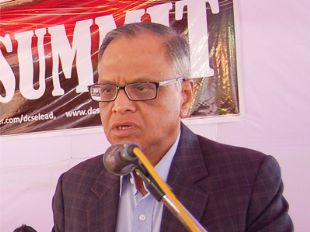Bangalore :
India’s only political action group formed by corporate heavyweights has begun its hunt for candidates to field in the assembly election due this year in Karnataka, an unprecedented effort by the business elite to influence politics.
Headed by the likes of Kiran Mazumdar-Shaw and Mohandas Pai and backed by NR Narayana Murthy, the Bangalore Political Action Committee, or BPAC, was formed to improve governance and the quality of life of citizens in the technology capital of India by growing, and then, flexing some political muscle.
Headed by the likes of Kiran Mazumdar-Shaw and Mohandas Pai and backed by NR Narayana Murthy, the Bangalore Political Action Committee , or BPAC, was formed to improve governance and the quality of life of citizens in the technology capital of India by growing, and then, flexing some political muscle.
BPAC, which launched its charter and agenda on Sunday at the hands of Murthy, said it has invited nominations from political parties and independent groups to identify suitable candidates for the election, due latest in May. Murthy, the chairman emeritus of Infosys , said he was hopeful that for the first time in his life he sees confidence that India can indeed solve its problems .
“I don’t see the same kind of helplessness that I saw when I was in my twenties. Therefore, I believe this is the right time to wake up, build an aspirational dream and an action plan,” he said. Murthy who has been an influential voice on economic and political developments in the country, urged political parties to publish their lists of candidates at least 60 days ahead of elections so that there is enough time to verify their backgrounds.
A Lobby for Urban Dwellers
The beginnings of the group can be traced last year when Biocon founder Shaw, Pai, and other eminent citizens of Bangalore came together to form a pressure group as mounds of garbage started piling up on Bangalore’s streets when the municipal body could not collect trash from the city.
“Sixty six years after independence , the educated class in India seems to have distanced itself from politics due to corruption and bad governance . We needed to create a lobby for educated, urban dwellers and our fight for a better Bangalore starts from here,” said Pai, vice-president of BPAC and a former director of Infosys.
Pai, who headed finance and human resources at Infosys, said BPAC would spend between Rs 1 crore and 2 crore on the upcoming elections and its yearly running expenses are estimated to be in the range of Rs 25 lakh to Rs 50 lakh. He said the expenses will be borne by the members and contributions from the public. The group, which also has other prominent Bangaloreans like retired IAS officer K Jairaj, athlete Ashwini Nachappa , civil society activist Ashwin Mahesh and entrepreneur RK Mishra among others, said its first phase of work will begin by encouraging voter registration efforts to maximise people’s participation in the elections.
“A lot of the problems happen because we as citizens are apathetic. Starting from Bangalore , we want to hold a candle for the rest of the country,” said Shaw, chairman and managing director of biotechnology firm Biocon and an active commentator on civic issues. She said BPAC has already received queries from groups in Patna and Kolkat to set up similar networks.
Bangalore contributes over 60% of the state’s gross domestic product but of the 224 seats in the Karnataka assembly, only 28 are allotted to the city. BPAC members said they do not have candidates in mind as of now. “We will first find a candidate for the assembly elections , and later for the Parliament as well as municipal body elections,” said Jairaj.
Shaw said BPAC aims to be an apolitical group, meaning its individual members have no interest in joining politics, but the group wants to be political in the governance it offers. The primary aim of the group is to curb corruption by financially supporting qualified candidates, irrespective of their party allegiance.
By targeting corrupt politicians and bad governance, Jairaj said the group is aware that its agenda may rub the political class in the wrong way. “We have a clear agenda that could change the face of urban governance. Let the political class react,” he said.
source: http://www.economictimes.indiatimes.com /Home> News> News by Company> Corporate Trends /by Indu NandaKumar, ET Bureau / February 04th, 2013
